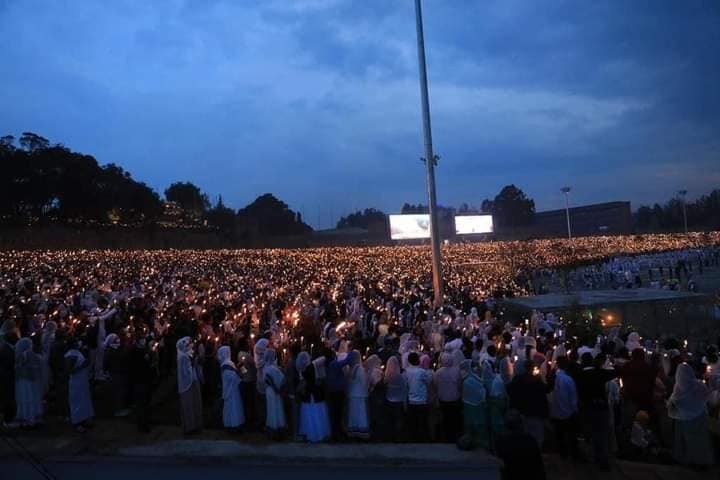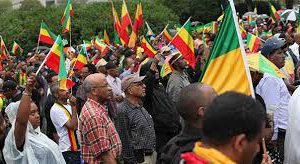
BY STAFF REPORTER
Australian Prime Minister Scott Morrison, recently expressed congratulatory message to Ethiopians in his country in connection with the recently started Ethiopian New Year.
The Premier in his message witnessed that Ethiopians have carried their rich culture, history and language to Australia.
Transmission of values is one of the opportunities for diaspora community at hand to promote their culture as well as safeguard the interest of their country of origin especially during challenges like the one Ethiopia is facing now.
The Ethiopians in Australia have also succeeded in promoting the values of their country of origin in Australia as witnessed by the Prime Minister of the Country.
Ethiopians live in hundreds of thousands in various countries of Europe, America, Middle East among others. In all the places they live they carry some of their cultural and linguistic features with them. Among them are the celebration of holidays that are unique to Ethiopia. Meskel is one of the holidays that is uniquely celebrated in Ethiopia but of big interest for the rest of the world.
The history of Meskel, the finding of the true cross goes back to the beginning of Christianity. In the centuries after the events described in the New Testament, Christianity was gaining a foothold in Europe, growing from an obscure cult in 300 AD to becoming the state religion of the Roman Empire by 380 AD, according to officeholidays.com.
The rise of Christianity during this period was largely due to the Roman Emperor Constantine, who declared himself a Christian while decriminalizing Christianity in 313 AD. Following his conversion, his mother, Empress Helena (later St. Helena) travelled to the Holy Lands to establish churches and spread the gospel in 326 AD.
While in Jerusalem, Helena had a dream in which she was told to light a bonfire and the smoke would indicate where the true cross was hidden. On waking, the bonfire was built and lit, and the smoke revealed the location of the three crosses that had been used for the crucifixions of Jesus and two others on Good Friday.
This tradition of the discovery of the true cross is celebrated by the Orthodox Church, but is popular in the Ethiopian Orthodox church as it is believed that a part of the true cross was brought to Ethiopia in the 15th century and is kept at Amba Geshen, a mountain fortress built in the shape of a cross.
Celebrations begin on the eve of the festival, known as Demera. Thousands gather in Meskel Square in the centre of Addis Ababa, the capital of Ethiopia, where the Demera bonfire is built, made of wooden poles surrounded by bundles of branches and torches, and decorated with green grass and Adey Abeba, Abyssinian daisies that symbolize the Ethiopian New Year.
The crowds are joined by hundreds of priests and deacons from churches around the city, chant hymns and prayers and perform their unique rhythmic dance in front of the pyre. At sunset, the patriarch of the Ethiopian Orthodox Tewahedo Church lights the bonfire, in honor of the bonfire that was lit by St. Helena.
The ashes are then marked on foreheads in the shape of a cross, similar to Ash Wednesday. Indeed, it is said that the discovery of the true cross took place in Spring, but that the festival was moved to avoid falling during Lent.
In 2013, Meskel was added to the Representative List of the Intangible Cultural Heritage of Humanity by the UN Agency for Education, Science and Culture.
In addition what makes Meskel different from others is that it is uniquely celebrated among the various ethnic groups of Ethiopia
in their own respective ways. The name of the holiday has also become synonymous with holiday or feast.
It is the holiday that is behind the strong working culture of various communities in Ethiopia. Youth and other working age people have to work hard the whole year round save money and have to return to their homesteads to celebrate the Maskel together with families and relatives. Among many of them it is unaffordable to miss the celebration of Meskel. This makes it the most long awaited holiday of the year.
Meskel is also one of the tourist attractions of the country. Every year thousands of tourists visit the country during the celebration of Meskel. Indeed the celebration takes place in a magnificent way especially during the eve where a big bonfire is set. Even though, the cross which is an icon in Christianity is accepted among Christians of many denominations throughout the world, Ethiopia and Eritrea along celebrate it in the fascinating way.
Ethiopians in various countries, like those in Australia can also take the holiday celebration as part of their national responsibility to promote their indigenous culture.
The Ethiopian Herald September 28/2021




